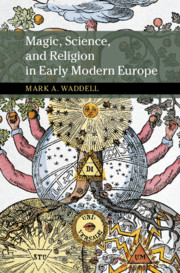Book contents
- Magic, Science, and Religion in Early Modern Europe
- New Approaches to the History of Science and Medicine
- Magic, Science, and Religion in Early Modern Europe
- Copyright page
- Dedication
- Contents
- Figures
- Acknowledgments
- Introduction
- 1 Hermeticism, the Cabala, and the Search for Ancient Wisdom
- 2 Witchcraft and Demonology
- 3 Magic, Medicine, and the Microcosm
- 4 A New Cosmos
- 5 Looking for God in the Cosmic Machine
- 6 Manipulating Nature
- 7 A New World?
- Conclusion
- Bibliographical Essays
- Index
4 - A New Cosmos
Copernicus, Galileo, and the Motion of the Earth
Published online by Cambridge University Press: 22 January 2021
- Magic, Science, and Religion in Early Modern Europe
- New Approaches to the History of Science and Medicine
- Magic, Science, and Religion in Early Modern Europe
- Copyright page
- Dedication
- Contents
- Figures
- Acknowledgments
- Introduction
- 1 Hermeticism, the Cabala, and the Search for Ancient Wisdom
- 2 Witchcraft and Demonology
- 3 Magic, Medicine, and the Microcosm
- 4 A New Cosmos
- 5 Looking for God in the Cosmic Machine
- 6 Manipulating Nature
- 7 A New World?
- Conclusion
- Bibliographical Essays
- Index
Summary
In 1632, the Italian astronomer Galileo Galilei (1564-642) was placed on trial by the Roman Inquisition for daring to claim that the Earth moved. Since then, many people have interpreted this encounter as a battle between science and religion. The story of how Galileo arrived in front of the Inquisition, however, is both more complicated and more interesting than one of simple conflict. When Nicolaus Copernicus (1473-543) suggested that the Earth moved around the Sun in his De revolutionibus of 1543, he launched a debate about more than the structure of the universe. His work called into question the legitimacy of traditional beliefs, and ultimately led Galileo to argue that he, not the theologians of the Catholic Church, had the right to study and interpret the natural world. It was a far more radical position than those taken by other astronomers, like Tycho Brahe (1546-601) and Johannes Kepler (1571-630), who proposed models of the cosmos inspired by religious faith. More than anything, Galileo’s story centers around a single question: Who should have the authority to proclaim the nature of reality?
- Type
- Chapter
- Information
- Magic, Science, and Religion in Early Modern Europe , pp. 102 - 134Publisher: Cambridge University PressPrint publication year: 2021

